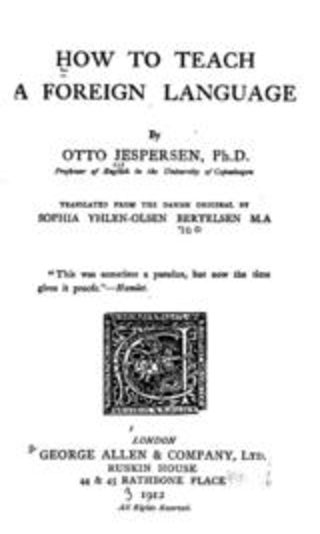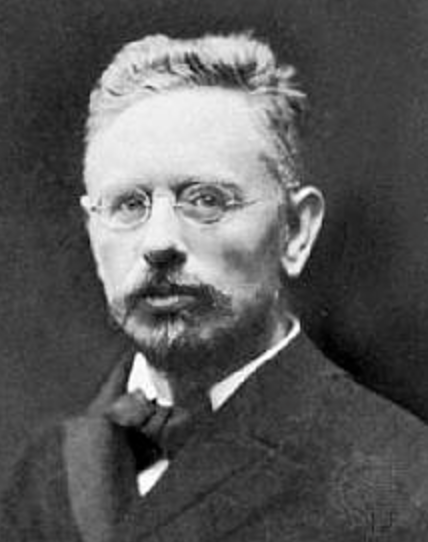Otto Jespersen - extracts
Below are extracts from Otto Jespersen's (1904) book How to Teach a Foreign Language, as selected by Martin McMorrow and shared in a post to the IATEFL Research SIG discussion list on 27 January 2015. Martin supplied the headings also, in order to highlight the current, continuing relevance of these quotations (indeed, he didn't initially reveal that the book they're from was written more than a hundred years ago - perhaps the extracts could be used in a similar way in teacher education situations, with a view to historical awareness-raising). Other Warwick ELT Archive Hall of Fame pages contain information about Jespersen's life and career, and about his published works.


From Jespersen, O. 1904. How to Teach a Foreign Language. London: Swan Sonnenschein / Allen & Unwin. [Translation by S. Yhlen-Olsen Bertelsen of Sprogundervisning, 1901, Copenhagen: Schuboteske Forlag.] The full book is accessible to read via 'Open Library' here, and the page numbers below refer to this edition.
Reminder: the deliberately anachronistic headings below are not Jespersen's but Martin McMorrow's - with question marks added for publication (with Martin's permission) here.
A Task- / Project-based curriculum?
‘[T]he first condition for good instruction in foreign languages would seem to be to give the pupil as much as possible to do with and in the foreign language; he must be steeped in it, not only get a sprinkling of it now and then; he must be ducked down in it and get to feel as if he were in his own element, so that he may at last disport himself in it as an able swimmer.’ (p. 48)
A methodology which prioritises learner-centred discovery?
‘All instruction must spur the pupil on with problems that are not too easy.’ (p. 28)
'[Q]uestions must be asked as naturally as possible [...] with liveliness, tact and constant consideration for the pupils’ standpoint’ (p. 105)
‘Never tell the children anything that they can find out for themselves.’ (p. 127)
A lexical approach, with a selective, inductive approach to grammar and a focus on lexical chunks?
'… It never seems to have occurred to the authors of some (textbooks) that there might be a limit to the amount of rubbish that can be offered children under the pretext of teaching them grammar.' (p. 13)
‘the deviating forms must be learned as if they were merely matters of vocabulary.’ (p. 38)
'the most indispensable expressions often are those irrational groups which cannot be constructed merely of words and grammatical rules, expressions like ‘What’s the matter? I couldn’t help laughing. Serve you right … When the pupil doesn’t get a good deal of that kind of thing as soon as possible .. the result is that when he is left to his own resources he takes each word of an English phrase that happens to occur to him and translates it literally into the language which he is trying to speak.’ (pp. 16–17)
Engagement with the ‘whole person’?
'The teacher must make the pupils feel interested in the subject; they must have a vivid conception of the reward that their work will bring them, so that it will seem worthwhile for them to exert themselves.' (p. 8)
‘And since there is a sensible meaning in all that is read or said or done, the interest is awakened and held, and the instruction becomes not only varied, but what especially beseems living languages, it becomes in the deepest and best sense of the word really living.’ (p. 192)
Less emphasis on formal testing
‘The worst canker in our school system is the examinations. Everything is arranged with a view to examinations; the parents, the children, and unfortunately also a number of the teachers care for nothing but the results attained in the examinations.' (p. 186)
'[T]each in the right way, then there will be life and love in it all, and when the examination comes your pupils will know more than if your teaching from the very beginning had been fettered by examination requirements.’ (p. 9)
An ethical basis to our profession, with a commitment to peace and understanding between people(s) and to ongoing professional development
‘[T]eachers of modern languages should ever remember that it is their mission to make their countrymen know and understand foreign nations. […] [L]anguage teachers all over the world may ultimately prove more efficacious in establishing good permanent relations between the nations than Peace Congresses at the Hague.’ (pp. 179-80)
'It is a shame how little is done to give high-school teachers opportunities for further improvement; they ought to have abundant access to courses in advanced work, but especially to many and liberal travelling scholarships, so that no conscientious teacher in foreign languages need do without a tolerably long stay among the people whose language he (she) [sic] teaches. Poor pay and long hours, too, naturally lead to a teacher’s looking merely to examination results.' (pp. 189-90)
'[Modern languages] want to be treated as living, and the method of teaching them must be as elastic and adaptable as life is restless and variable.' (p. 4)
